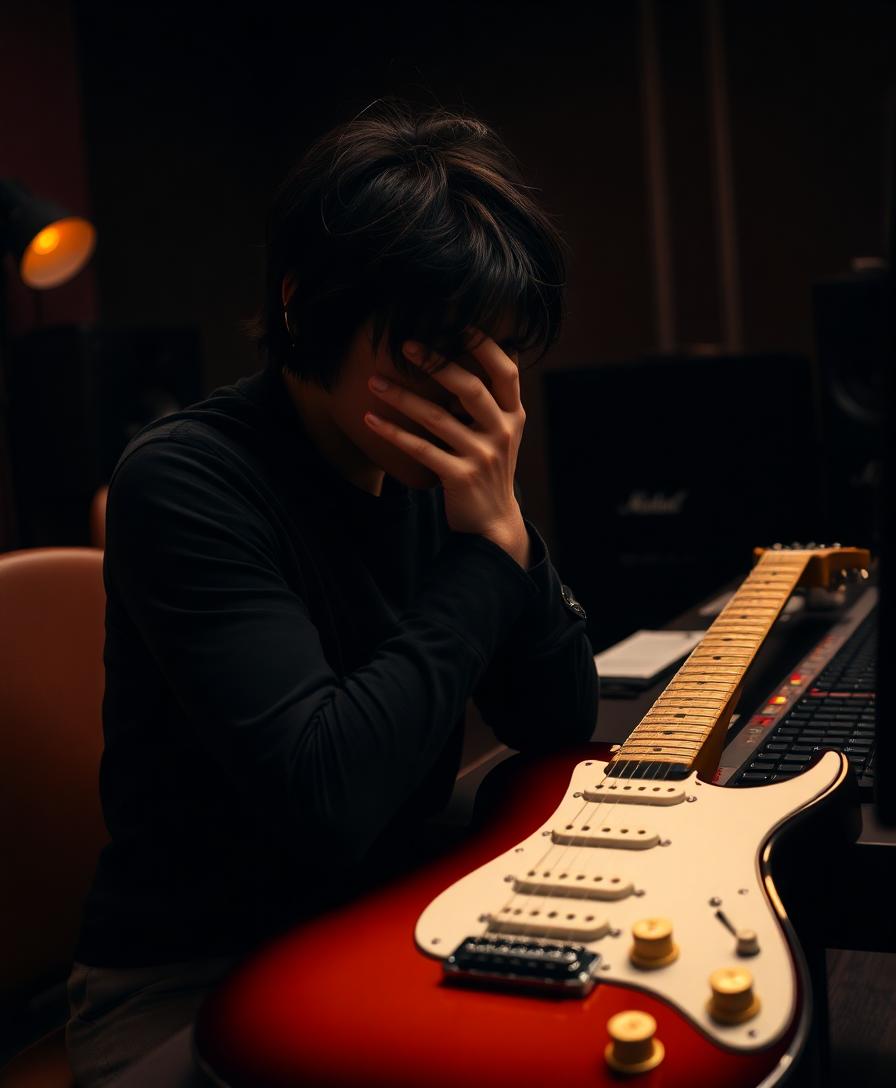
Burnout is a sneaky culprit that often creeps up on beginner guitarists, turning passion into frustration. It’s that wall you hit after endless repetition of the same chords and scales, feeling like you’re going nowhere fast.
Been there, done that. The good news is, avoiding guitar burnout is 100% possible, and it doesn’t require magic, just a few smart strategies to keep the fire alive.

In this article, I’ll show you how keeping your practice sessions fresh, fun, and flexible can reignite the joy you felt when you first picked up the guitar.
Learning guitar should feel exhilarating, not exhausting. Ready to bring the fun back to your fretboard? Let’s make sure that spark doesn’t fade!
Check out these helpful tips to prevent burnout and stay motivated on your musical journey while juggling life’s other commitments with life as a musician.
Starting your guitar-playing journey can feel like a thrilling adventure, but let’s face it, hitting a wall is all too common.
Burnout doesn’t take long to sneak in, especially when frustration builds up from unrealized progress or physical fatigue.
If you’ve ever thought, “Why does playing guitar feel like a chore instead of a joy?”—you’re not alone, my friend. Let’s unpack how to spot burnout and what fuels it, because knowing is half the battle.
Recognizing the red flags early can save your guitar journey from becoming a dreaded task. Beginner guitarist burnout often looks like:
When these symptoms show up, don’t brush them off. Taking them seriously is the first step to reigniting your passion. Sometimes, you might just need to revisit your practice style or prioritize recovery, as I explain in this quick guide for developing better guitar habits.
It might be tempting to blame it all on busy schedules, but burnout often stems from how we approach learning the guitar rather than external factors. Here are the USUAL SUSPECTS:
Burnout isn’t just about hitting a slump; it’s about the mindset you bring while learning. Shift your focus from perfection to progress and remember, small wins lead to big changes over time. Keep it fresh. Keep it fun. You’ve got this!

Burnout is more than just a frustrating barrier; it’s the mood killer that can take the joy out of playing your guitar. But with the right tools and mindset, it doesn’t have to be your story. Here’s how to stick with your guitar dreams without hitting that dreaded wall.
Learning guitar feels incredible when you celebrate progress, but shooting too high too soon? Total buzzkill. That’s why setting realistic goals is your best friend. Start small and build from there. Think short-term wins and long-term aspirations that make sense for your pace.
For example:
See what I’m saying? By breaking it down, you’ll get those little wins that keep you hungry for the next challenge. Like in a football game, every yard gained, gets you one step closer to reaching your goals. Before you know it—TOUCHDOWN!
Let’s be honest, doing the same drills over and over? It’s like eating plain oatmeal every single day, eventually, you’re gonna want to tear your hair out (or slap the strings in frustration). Mix it up!
Here are some ways to spice up your sessions:
Think of it this way, every session should feel like you’re putting together a musical puzzle. Trust me, variety is the soul of staying sane and engaged!

Playing guitar for hours without breathing room might seem productive, but it’s actually the fastest road to burnout city.
When your fingers start feeling like overcooked spaghetti, it’s time to pause. Taking breaks doesn’t mean giving up, it means you’re in it for the long haul.
Tips to pace yourself:
Think of practice like lifting weights: too much all at once can hurt more than it helps. Space it out, and each strum will feel fresh and purposeful.
Why go it alone when so many amazing tools can help you out? Whether it’s a metronome keeping your rhythm tight or online tutorials walking you through challenging riffs, there’s no shame in leaning on resources.
Check out Simply Guitar for interactive lessons that will challenge you. I highly recommend it!
Some essentials to consider:
The trick is finding what works for you. Think of these tools as cheat codes, not to skip the grind, but to make the grind SMART.
With these strategies, burnout just hit the back burner. Let’s keep it FUN, keep it fresh, and keep making music!
One of the best ways to avoid beginner guitarist burnout is by fostering a positive and supportive environment around your practice.
Finding a community of fellow guitarists and creating a personalized practice space can be a game changer.

Learning guitar doesn’t have to be a solo mission. In fact, connecting with other guitarists—whether beginners like you or seasoned players, can supercharge your motivation.
Why?
It’s a lot like working out; when you’ve got a buddy or group, you’re less likely to give up on the tough days.
Here’s how building that connection helps:
Don’t underestimate the power of community. Some great resources are local guitar meetups, online forums, or even structured lessons to stay engaged.
If you’re stumped on how to start, check out rock guitar lessons tailored for beginners to get that boost of support and direction:
Read More:
Nothing kills creativity faster than an uncomfortable or chaotic practice environment. Your practice space should be your zen zone, think of it like your musical cocoon where distractions are left at the door.
Here’s how to set it up for maximum focus and enjoyment:
Your practice space doesn’t have to be extravagant. A cozy corner with minimal distractions and a pinch of personalization will go a long way.
For more on practical tips to make your practice smoother and even more enjoyable, take a peek at Essential Finger Exercises for Beginner Guitarists.
Remember, every bit of energy you invest in building a supportive environment, both social and physical, pays off not just in preventing burnout, but in turning your guitar journey into something you genuinely look forward to every day.
Burnout often begins not in the fingers, but in the mind.
The way we frame our guitar-playing journey, how we handle progress, setbacks, and expectations can be the difference between staying motivated and throwing in the towel.

If you’ve ever found yourself avoiding practice or feeling overwhelmed because you’re “not good enough,” then it’s time to shake up your mindset. Let’s look at two practical ways to do just that.
Think about this, when was the last time you gave yourself credit for playing just a simple chord cleanly or nailing the rhythm of one verse?
A lot of beginner guitarists get so fixated on the big picture that they forget to savor the little wins along the way.
Trust me, progress doesn’t always come in blockbuster leaps.
It’s usually those baby steps, forming smoother transitions, holding a chord longer, or finally hitting that tricky F chord cleanly, that add up to transformative changes.
Here’s how celebrating small wins can lift your mindset:
One way I like to keep it visual is by creating a “win tracker.” Write down every tiny skill you’ve improved on, like switching chords or remembering a melody by ear. Also, record your progress by using your smartphone.
Listen to your own playing to hear where you can make improvements. Be honest with yourself, don’t hide your mistakes, OWN THEM!
Seeing your list grow is incredibly satisfying. And if you’re hungry for ideas on how small changes create powerful momentum, check out Finding Motivation & Inspiration in Your Guitar Playing.
You’ll see that small wins aren’t just nice, they’re necessary.
Let’s squash a common myth: making mistakes doesn’t mean you’re failing. Mistakes are proof you’re pushing yourself and exploring new terrain.
When you trip up on a riff or botch a barre chord, you’re not “bad” at guitar, it’s part of the process. This shift in thinking is what’s known as a growth mindset, and it’s a huge game-changer for avoiding burnout.
Think of it this way: if you mess up while learning a solo, does it mean soloing isn’t for you? Nah. It just means you’re stretching skills you haven’t mastered yet.
That word—yet—is key. With practice, you’ll get there.
How can you adopt a growth mindset while learning guitar? Here are a few tips:
A growth mindset doesn’t just help you learn faster; it keeps your time with the guitar fun and exploratory. To dive deeper into channeling positivity into your playing and pushing past mental barriers, explore more strategies for improvement at Building Speed and Precision in Your Guitar Playing.
Mindset fosters resilience. By celebrating each small victory and reframing setbacks as growth moments, you’ll keep your passion strong and your burnout at bay. Ready to see how these shifts can amp up your motivation? Let’s keep going!
Burnout can feel like the final curtain call on your guitar-playing dreams, but it doesn’t have to be.
Remember, it’s not about mastering everything overnight; it’s about keeping the journey enjoyable and fulfilling. By embracing variety, setting achievable goals, pacing yourself wisely, and building a supportive practice environment, you’re not just avoiding burnout, you’re preparing for a lifetime of musical bliss.
Every note you play brings you closer to who you want to be as a guitarist. Stick with it. Try new things. Celebrate the little wins. Progress, however small, is still progress, and that’s worth every strum.
Ready to take the next step? Dive deeper into more ways to enhance your practice routine with essential tips for developing good guitar-playing habits.
Let’s keep that passion burning bright.

I’ve been playing guitar 40 years now; writing, recording, and rocking in bands. Randy Rhoads, Warren DiMartini, and of course, Jimi Hendrix all lit the fire for me, and I’ve been chasing that passion ever since.
andrejs says:
This article is a fantastic resource for beginner guitarists who may be struggling with burnout. Learning any instrument can feel overwhelming at times, and it’s easy to lose motivation when progress seems slow. The strategies shared here—like celebrating small wins, adding variety to practice, and remembering why you started—are great ways to stay engaged and excited about playing.
One key takeaway that really stands out is the importance of realistic goal-setting. Many beginners fall into the trap of expecting instant results, which can quickly lead to frustration. Breaking down progress into manageable steps, like perfecting a single chord progression before attempting a full song, is a smart way to keep momentum going.
The emphasis on fun is another crucial point. Guitar should be something you enjoy, not just a chore to check off a list. Experimenting with new styles, playing around with riffs, and even just jamming freely can make a huge difference in keeping the passion alive.
Overall, this article does an excellent job of addressing beginner guitarist burnout and offering practical, actionable solutions. A must-read for anyone picking up the guitar!
Steve says:
I really appreciate the kind words.
Michael Gray says:
This is an excellent article that covers burnout and how to avoid it. I wish I could have seen it years ago while attempting to learn how to play the guitar. I would imagine it would have helped me stick with it rather than pursuing the drums!
Steve says:
Thanks for reading, Michael. I always emphasize that having fun is at the core of learning to play guitar. If you place too much pressure on yourself, you will eventually get burned out. Reflecting on why you started in the first place will help you to stay balanced and keep your motivation high.